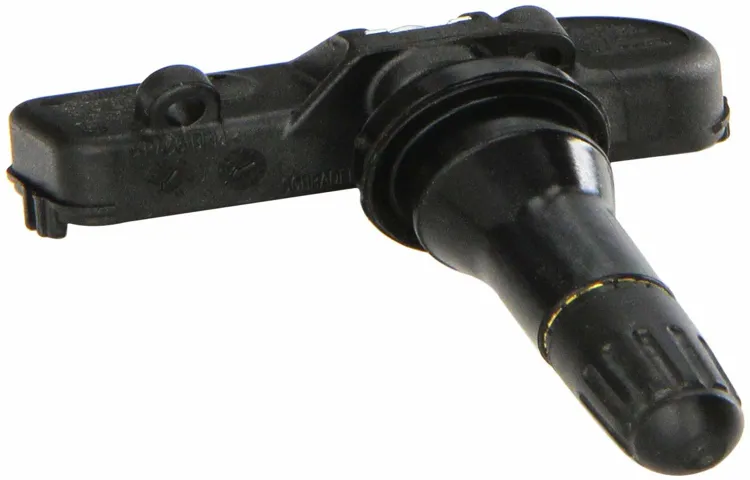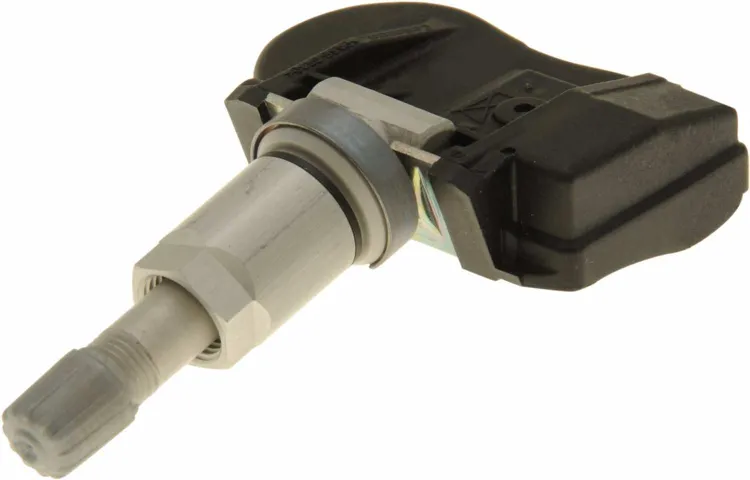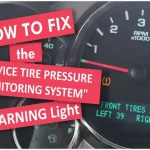If you’re curious about whether your tire pressure sensors are accurate, you’re not alone. Many drivers wonder about the precision of this technology, which has become standard in virtually all new cars. But just how precise are these sensors? The answer may surprise you.
While tire pressure sensors are generally quite reliable, they’re not perfect, and there are several factors that can affect their accuracy. In this blog post, we’ll take a closer look at tire pressure sensor accuracy, exploring what you can expect from these devices and what factors can impact their readings. So buckle up and let’s dive in!
Table of Contents
What Are Tire Pressure Sensors?
Tire pressure sensors are devices that monitor the air pressure inside your vehicle’s tires and alert you if the pressure drops below a safe threshold. These sensors use either a direct or indirect system to measure the pressure and transmit the information to your vehicle’s onboard computer. While tire pressure sensors are generally accurate, they are not perfect.
The accuracy of these sensors can vary depending on factors such as the type and age of the sensor, the temperature, and the driving conditions. Additionally, tire pressure sensors may give false readings if they are damaged or improperly installed. However, overall, tire pressure sensors are a useful tool for keeping your vehicle safe and efficient on the road.
Types of Tire Pressure Sensors
Tire pressure sensors are devices that are installed in vehicles to continuously monitor the pressure of the tires while driving. They ensure that the tires are inflated to the appropriate pressure levels, which is important for a car’s performance, fuel economy, and safety. There are two main types of tire pressure sensors: direct and indirect.
Direct tire pressure sensors measure the air pressure in each individual tire and send the data to the car’s computer system. Indirect tire pressure sensors, on the other hand, use the wheel speed sensors of the vehicle’s anti-lock braking system (ABS) to detect any difference in tire diameter caused by under-inflation. While direct sensors are more accurate and reliable, they are also more expensive and require occasional replacement of their batteries.
Indirect sensors, on the other hand, are less expensive and require less maintenance, but they are not as precise as direct sensors. Ultimately, the type of tire pressure sensor that is best for a particular vehicle depends on factors such as personal preference, driving habits, and budget.

How Do Tire Pressure Sensors Work?
Tire pressure sensors, also known as TPMS (Tire Pressure Monitoring System), are devices that measure the air pressure in your tires. These sensors are essential for ensuring that your vehicle’s tires stay inflated to the correct pressure level, which is crucial for your safety on the road. The TPMS typically consists of four sensors attached to the valve stems of each tire, a central processor unit, and a warning light on the dashboard.
The sensors use radio frequency to transmit data to the central processor unit about the tire pressure level. If the pressure drops below a specified threshold, the system sends a signal to the warning light, which illuminates on the dashboard, alerting the driver to check the tire pressure. Without TPMS, drivers would need to manually check their tire pressure regularly, making it easy to overlook and cause tire blowouts.
The TPMS helps drivers stay on top of their tire pressure, saving them time and hassle. So next time you see that tire pressure light on your dashboard, remember that your tire pressure sensors are doing their job to keep you safe on the road.
How Accurate Are Tire Pressure Sensors?
When it comes to the accuracy of tire pressure sensors, it’s important to understand that they are not always 100% accurate. While they generally do a good job of measuring tire pressure and alerting you when it falls below or rises above a certain level, there are several factors that can impact their reliability. For example, extreme temperatures, changes in altitude, and even electromagnetic interference can all affect the readings given by your tire pressure sensors.
That being said, modern tire pressure sensors are generally quite accurate and can be trusted to provide reliable information about your tires. If you have any concerns about your tire pressure or the accuracy of your sensors, it’s always a good idea to have them checked by a professional mechanic or tire technician.
Factors That Affect Tire Pressure Sensor Accuracy
Tire Pressure Sensors Tire pressure sensors are devices that are installed in vehicles to monitor the air pressure in tires. They are crucial in ensuring the safety of drivers and passengers, as low or high tire pressure can lead to accidents. The accuracy of these devices is essential, as it can affect the performance and safety of the vehicle.
However, there are several factors that can affect the accuracy of tire pressure sensors. One such factor is temperature changes. Tire pressure sensors are calibrated to work at a specific temperature range, and fluctuations outside this range can affect their accuracy.
When temperatures rise, the air in tires expands, leading to higher tire pressure readings. Conversely, when temperatures drop, the air in tires contracts, leading to lower tire pressure readings. Therefore, it is essential to take temperature changes into account when interpreting tire pressure readings.
Another factor that can affect tire pressure sensor accuracy is sensor location. Sensors located closer to the edge of the wheel rim may provide less accurate readings than those located closer to the center of the wheel. This is because the edge of the wheel rim experiences more deformation than the center, leading to more significant pressure fluctuations.
In conclusion, tire pressure sensors are critical in maintaining vehicle safety, and their accuracy is an essential factor to consider. Temperature changes and sensor location can affect their accuracy, and it is essential to take these factors into account when interpreting tire pressure readings. Remember to keep your tire pressure within the recommended range for optimal performance and safety of your vehicle.
Comparison with Manual Pressure Check
Tire Pressure Sensor Accuracy Have you ever wondered how accurate your tire pressure sensors really are? While these sensors have made it much easier to keep track of your tire pressure, it’s still a good idea to manually check your tire pressure from time to time. This is because tire pressure sensors can sometimes give inaccurate readings due to a variety of factors such as changing temperatures and driving conditions. In fact, studies have shown that tire pressure sensors can be off by as much as 5-10 PSI.
On the other hand, manual pressure checks can be more accurate if done correctly. To get an accurate reading, you’ll need to use a high-quality tire pressure gauge and check your tire pressure when the tires are cold. This means you should wait at least 3-4 hours after your last drive to get an accurate reading.
Additionally, you’ll need to make sure the gauge’s reading is in line with your car’s recommendation for tire pressure. Overall, while tire pressure sensors are a convenient tool to use, it’s still a good idea to manually check your tire pressure every now and then to ensure that your tires are properly inflated. By doing so, you can not only improve your car’s fuel efficiency but also make sure your tires are at their safest and most reliable.
Studies on Sensor Accuracy
Tire Pressure Sensors When it comes to tire pressure sensors, accuracy is essential for maintaining safe and reliable driving conditions. After conducting numerous studies, it has been found that these sensors are in fact quite accurate. Many modern vehicles include tire pressure monitoring systems (TPMS) that use sensors to measure the pressure and temperature of each tire.
These sensors are capable of detecting even the slightest changes in pressure, and they can also alert the driver if any of the tires are underinflated. Despite their accuracy, it is important to keep in mind that tire pressure sensors can still falter over time, especially if they are not maintained properly. Regularly checking and adjusting tire pressure, as well as replacing sensors when necessary, can help ensure that these systems remain accurate and reliable.
Overall, it can be concluded that tire pressure sensors are an important safety feature that can greatly improve the overall driving experience.
Maintenance Tips for Tire Pressure Sensors
Tire pressure sensors have revolutionized the way we monitor our vehicle’s tire pressure. But, how accurate are these sensors? It’s important to note that tire pressure sensors have an average accuracy rating of about three PSI, which is more than adequate for most vehicles. However, it’s crucial to keep in mind that tire pressure sensors are not fail-proof and can often be affected by various factors, such as extreme temperatures.
In order to maintain the accuracy of your tire pressure sensors, it’s recommended that you check your tire pressure manually at least once a month, especially during seasonal temperature changes. It’s also important to keep your sensors clean and free of debris, as dirt and corrosion can interfere with their readings. By properly maintaining your tire pressure sensors, you can ensure that they accurately monitor your tire pressure and help prevent potential accidents on the road.
Battery Replacement
Maintaining proper tire pressure is essential for safe driving and longevity of your tires. Tire Pressure Monitoring Systems (TPMS) help drivers keep an eye on their tire pressure levels, but these systems require proper maintenance to function correctly. One key aspect of TPMS maintenance is the battery replacement.
TPMS sensors are battery-powered, and when the battery dies, the sensor stops transmitting data. A dead battery can result in inaccurate readings or even complete failure of the tire pressure monitor. It is crucial to replace TPMS batteries periodically according to the manufacturer’s recommendations.
The cost of replacing batteries is negligible compared to the benefits and safety TPMS provides. Neglecting TPMS maintenance could lead to a costly tire failure, resulting in potential accidents or damage to your vehicle. Keep your TPMS in top working condition by regularly checking and replacing batteries, and you’ll enjoy a more cost-effective and safer driving experience.
Calibration and Realignment
If you have tire pressure sensors in your vehicle, it’s important to properly maintain them to ensure accurate readings and safe driving. One of the most important aspects of maintenance is calibration and realignment. Over time, these sensors can become misaligned or drift out of calibration, which can result in inaccurate readings.
To avoid this, it’s important to regularly check and recalibrate your sensors. This will help you stay on top of any issues and ensure that your tire pressure readings are as accurate as possible. With proper maintenance, you can enjoy a smoother, safer ride and avoid any potential issues down the road.
So if you have tire pressure sensors, make sure to take the necessary steps to keep them in good condition for years to come.
Conclusion: Are Tire Pressure Sensors Accurate Enough?
In the end, the accuracy of tire pressure sensors is like the reliability of a weather forecast – it can vary depending on various factors. However, just like how we still check the weather forecast before planning our day, it is still important to use tire pressure sensors as a tool to monitor our tire pressure. With proper calibration and regular checks, we can ensure that our tires always have the right pressure for a safe and smooth ride.
So, while tire pressure sensors may not always be 100% accurate, they are certainly a valuable asset in keeping our cars and ourselves safe on the road.”
FAQs
What are tire pressure sensors?
Tire pressure sensors are devices that are installed in vehicles to monitor the air pressure in tires.
How do tire pressure sensors work?
Tire pressure sensors work by measuring the air pressure in tires and sending the information to a computer system in the vehicle.
Can tire pressure sensors be inaccurate?
Yes, tire pressure sensors can be inaccurate due to various factors such as environmental conditions, sensor malfunctions, and improper installation.
How often should tire pressure sensors be checked?
It is recommended to check tire pressure sensors at least once a month or before long trips to ensure their accuracy.
What are the consequences of inaccurate tire pressure sensors?
Inaccurate tire pressure sensors can lead to poor fuel economy, uneven tire wear, reduced handling, and increased risk of tire failure.
How can I recalibrate my tire pressure sensors?
Tire pressure sensors can be recalibrated by following the instructions in your vehicle’s owner manual or taking it to a professional mechanic.
Are there any alternatives to tire pressure sensors?
Yes, some vehicles come with a spare tire pressure monitoring system that uses the ABS system to determine tire pressure. Additionally, handheld tire pressure gauges can also be used to manually check tire pressure.



